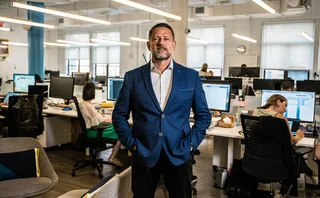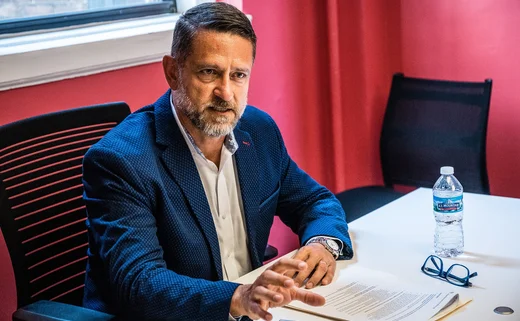Souheil Badran Oversees Northwestern Mutual's Innovation Program
After a run at Alibaba's Ant Financial, Badran is ready to lead the 160-year-old institution's digitization efforts.

Need to know
Souheil Badran has found his way from Alibaba’s unicorn startup Ant Financial to Northwestern Mutual, which was founded in the 1800s. His experience in a more agile environment is an asset to the buy-side shop, which is currently undergoing a digital transformation. Photos by Timothy Fadek
Here’s how it all started for Northwestern Mutual: As the story goes, on the morning of November 1, 1859, a train traveling from Fond du Lac, Wisconsin, to Chicago collided with an “ornery white steer” outside of Johnson Creek. The train derailed, falling into a ditch, killing 14 passengers and injuring dozens more. Two of those killed were policy owners with the Mutual Life Insurance Company of the State of Wisconsin, the precursor to Northwestern Mutual.
The claims totaled $3,500, which was $1,500 more than the two-year-old, Milwaukee-based company held. Samuel Daggett, then-president of the firm, and his fellow trustees borrowed money to make up for the shortfall.
This is all to say that Northwestern Mutual is an old institution, with old traditions, and old—or legacy, to use the polite term—systems. That’s where Souheil Badran comes in. Badran, who moved to Milwaukee in the 1980s from Lebanon, received his MBA in 1997 from Cardinal Stritch University, which is about a 15-minute drive north from Northwestern Mutual’s headquarters on East Wisconsin Avenue.
He joined the insurance company in January 2019 after two years at Ant Financial, which originated from Alipay, an Alibaba affiliate based in Hangzhou, China. Ant Financial, which serves as the payments arm of internet juggernaut Alibaba in America, could not be more different than the 162-year-old Northwestern Mutual—the startup raised $14 billion in a 2018 funding round, and its valuation was once larger than Goldman Sachs. Badran, who served as president for the Americas, helped launch the firm in the US.
But Northwestern Mutual offered an intriguing opportunity for Badran—a chance to revolutionize a respected-yet-aged institution as its chief innovation officer.
In this role, he is now working toward a full digital transformation of the insurance and asset management company by leveraging his experience in the fintech startup world. His extensive technology and innovation experience brings a fresh perspective to a traditionally staid market.
Before the innovating could begin, though, Badran says he first had to take stock of the legacy systems at Northwestern Mutual and figure out how to best approach digital transformation.

“As chief innovation officer, anytime you’re going through a transformation, you have to look at what assets you have in place today and what exists across the organization. Part of the formula is understanding what your customers and key stakeholders are looking for,” Badran says. “For example, we want to provide easy access to services for our clients and our Northwestern Mutual financial advisors. As companies decide how to modernize and transform, they need to consider what components of legacy systems need to stay in place. It could be easy sometimes to say, ‘let’s move everything to the cloud,’ but you need to again assess [whether or not] that’s the best decision to achieve your goals.”
Northwestern Mutual, which reported $128 billion in assets under management in 2018, is now changing its legacy infrastructure to support new systems. It is focusing on two different aspects of technological change. First, it is leaning more heavily on cloud-based tools and platforms. Second, it is investing in startups through a $150 million venture fund that is part of its larger plan around technology.
Badran is no stranger to new technologies. As president of Ant’s US operations, he gained a peek into a unicorn startup environment where innovation was de rigueur. And it allowed him to blend his interest in finance with that of technological innovation.
“What got me interested [in finance] was that I was always interested in how to make money—how people make money and how companies make money. I started my career as a developer many years ago in financial services around cash management,” Badran says.
He adds that he was more of a techie when he was younger, but with the years he spent in the industry, he’s learned to balance the needs of both technology and the business.
After beginning his career in fintech, he decided to explore another technology sector and moved to security firm Verisign in 2000, where he was vice president and a general manager, before leaving in 2007. Badran says working at Verisign showed how important privacy is to clients and to financial services, so he wanted to marry both in his work. After his stint at Verisign, he moved back to the world of financial technology in senior roles at First Data Corp and Digital River, before joining credit card platform provider Edo Interactive as president and CEO, then moving to lead Ant Financial and eventually to Northwestern Mutual.
Fail Fast
Badran admits that what he brings to the table is a more agile perspective when it comes to tech development. With his background in a fail-fast company, his experience in a less constrained environment goes a long way towards his support of cloud. Beyond that, his team is also looking at how artificial intelligence (AI) can help improve customer service.
Since Northwestern Mutual is primarily an insurance company, with wealth and asset management components, a lot of its innovations are geared toward insurance clients. As such, it has begun implementing AI in its call centers for personalized services, but has also used the technology for improved underwriting, claims processing, fraud detection, and lead generation. The company is also developing APIs to integrate more easily with other partners.

“We’re driving collaboration between the business, technology, and innovation teams to ensure that we are aligned about where we need to be 18 to 24 months from now. Over the last five years, Northwestern Mutual has been on a path to transform the way people experience financial security,” Badran says. “Now I’m able to introduce the kind of expertise I bring, which is a more agile mentality. We need to be able to try fast, fail fast and keep on going—nothing can slow us down. I think of it as techfin versus fintech. That’s the kind of mentality I’m bringing into the Northwestern Mutual teams across both innovation and technology, and really across the enterprise.”
Much of the focus for Badran and his team is on figuring out how technology can help their next generation of clients feel more connected to the firm. It is not just about bringing the company to the modern era, but also ensuring its clients interact with the organization in the manner they feel most comfortable with. Badran notes that many wealth and asset management clients feel like they don’t need constant handholding from a portfolio manager, so Northwestern Mutual is developing tools to help guide more DIY-oriented clients to manage their own investments and use AI to better detect when a manager can step in.
Separate but Together
Northwestern Mutual differentiates between its technology and innovation teams, with both working together but not under the same umbrella. This was one of the distinctions Badran found very attractive in the company and one he will continue to foster.
“One of the things I’m really proud of with the team is that we never do things in a vacuum, and there is constant interaction between the clients, our financial advisors, and our teams internally. It’s an ongoing process, so when we’re developing a new set of solutions, we get input directly from our users,” Badran says. “We also do roundtables with our clients to make sure that what we’re developing can meet our needs and is satisfactory to what they would be looking for from Northwestern Mutual.”
Separating the tech and innovation units allows the innovation team to remain focused on actually innovating, rather than worrying about the day-to-day nuts and bolts of the organization. And since they still work closely together, feedback coming from different departments to understand what needs to be added or fixed becomes integral to the process.
Though he believes technology is now driving finance, what he doesn’t forget is that institutional knowledge is an important part of being successful. This institutional knowledge brings with it an understanding of the technology’s users and how they will react to the user experience.
Developing Talent
While the company is in the process of transformation, Badran says his ultimate goal is to get this change culture ingrained into the firm.
“You can only transform for so long—at some point, it must be part of your business. Northwestern Mutual’s transformation is now a part of the business, and part of that is the collaboration between technology and the business,” he says.

One of the biggest projects of Northwestern Mutual is one Badran is deeply passionate about—investing into the technology talent of Milwaukee.
Northwestern Mutual is not just about trying new technology for itself; it is also aiming to invest in startups in the hope that it will be a customer of them, or even a partner. Most of all, it wants to create an environment where it can pull not just technology but talent as well. With its venture fund, it invests in startups developing technology for Northwestern Mutual’s different business lines. Badran says the fund has already invested $35 million for 15 initiatives. This is the second venture round for Northwestern Mutual—in 2017, it backed 14 companies and invested $43 million.
The firm also helped to create the first data science institute in Wisconsin, which is shared by the University of Wisconsin–Milwaukee and Marquette University. Northwestern Mutual pumped $40 million into the institute, and the first class will begin in the fall of this year.
Badran says the investment is not just to put money back into the community that has hosted the firm for years, but also to develop a larger talent pool it can tap as data becomes a larger and larger part of all functions of Northwestern Mutual.
“We’re excited because we’re helping grow that next generation in terms of innovation and education around these services, [and] within the community as well,” Badran says. “In our business, everything is about data. Understanding the data you have is critical, and what additional data you can complement it with gives you the ability to drive analytical tools and outcomes that can help shape the business and drive it forward. You’re not just looking to outsource—it’s really building the talent within the organization.”
The company also partnered with other Milwaukee-based firms including Foxconn Technology Group, Aurora Health, and Johnson Controls for the Wisconn Valley Venture Fund, which aims to invest in and attract technology companies to open offices in Wisconsin. Northwestern Mutual put $25 million into the venture. The goal of the fund is to turn Wisconsin into a global technology hub.
For Badran, this means he can bring some of the fast-paced nature of New York and Silicon Valley that he misses to the city he loves. He says the hustle and bustle of the more traditional centers of finance and technology gets him inspired and he’d like to see a lot of that talent grow in Milwaukee. After all, one of the reasons that tipped his decision to join Northwestern Mutual was the fact that it’s based in Milwaukee, where he and his family have lived for years. He’s excited about the possibility of bringing some of the excitement of technology and financial hubs to his hometown, and coming from a person who is at the office at 7:30 am after a workout, it seems his go-getter personality fits very well into the environment he’s trying to create.
“I’d love to see the investment in Milwaukee boosted even more and that’s why we’re spending time, money, effort and resources on our innovation labs and data science,” he says.
Badran may have come from a more agile background, working for one of the hottest fintech firms in recent years, but it is his passion for innovation and transformation that’s kept him moving. His innate interest in understanding how change can filter through a firm lets him remain plugged into the needs of Northwestern Mutual’s customers.

Only users who have a paid subscription or are part of a corporate subscription are able to print or copy content.
To access these options, along with all other subscription benefits, please contact info@waterstechnology.com or view our subscription options here: https://subscriptions.waterstechnology.com/subscribe
You are currently unable to print this content. Please contact info@waterstechnology.com to find out more.
You are currently unable to copy this content. Please contact info@waterstechnology.com to find out more.
Copyright Infopro Digital Limited. All rights reserved.
As outlined in our terms and conditions, https://www.infopro-digital.com/terms-and-conditions/subscriptions/ (point 2.4), printing is limited to a single copy.
If you would like to purchase additional rights please email info@waterstechnology.com
Copyright Infopro Digital Limited. All rights reserved.
You may share this content using our article tools. As outlined in our terms and conditions, https://www.infopro-digital.com/terms-and-conditions/subscriptions/ (clause 2.4), an Authorised User may only make one copy of the materials for their own personal use. You must also comply with the restrictions in clause 2.5.
If you would like to purchase additional rights please email info@waterstechnology.com
More on Emerging Technologies
Data standardization is the ‘trust accelerator’ for broader AI adoption
In this guest column, data product managers at Fitch Solutions explain AI’s impact on credit and investment risk management.
BNY inks AI deal with Google, Broadridge moves proxy voting to AWS, Expero delivers ICE market data, and more
The Waters Cooler: TSX Venture Exchange data hits the blockchain, SmartTrade acquires Kace, and garage doors link to cloud costs in this week’s news roundup.
Everyone wants to tokenize the assets. What about the data?
The IMD Wrap: With exchanges moving market data on-chain, Wei-Shen believes there’s a need to standardize licensing agreements.
Google, CME say they’ve proved cloud can support HFT—now what?
After demonstrating in September that ultra-low-latency trading can be facilitated in the cloud, the exchange and tech giant are hoping to see barriers to entry come down.
Waters Wavelength Ep. 342: LexisNexis Risk Solutions’ Sophie Lagouanelle
This week, Sophie Lagouanelle, chief product officer for financial crime compliance at LNRS, joins the podcast to discuss trends in the space moving into 2026.
Citadel Securities, BlackRock, Nasdaq mull tokenized equities’ impact on regulations
An SEC panel of broker-dealers, market-makers and crypto specialists debated the ramifications of a future with tokenized equities.
BlackRock and AccessFintech partner, LSEG collabs with OpenAI, Apex launches Pisces service, and more
The Waters Cooler: CJC launches MDC service, Centreon secures Sixth Street investment, UK bond CT update, and more in this week’s news roundup.
Tokenized assets draw interest, but regulation lags behind
Regulators around the globe are showing increased interest in tokenization, but concretely identifying and implementing guardrails and ground rules for tokenized products has remained slow.







